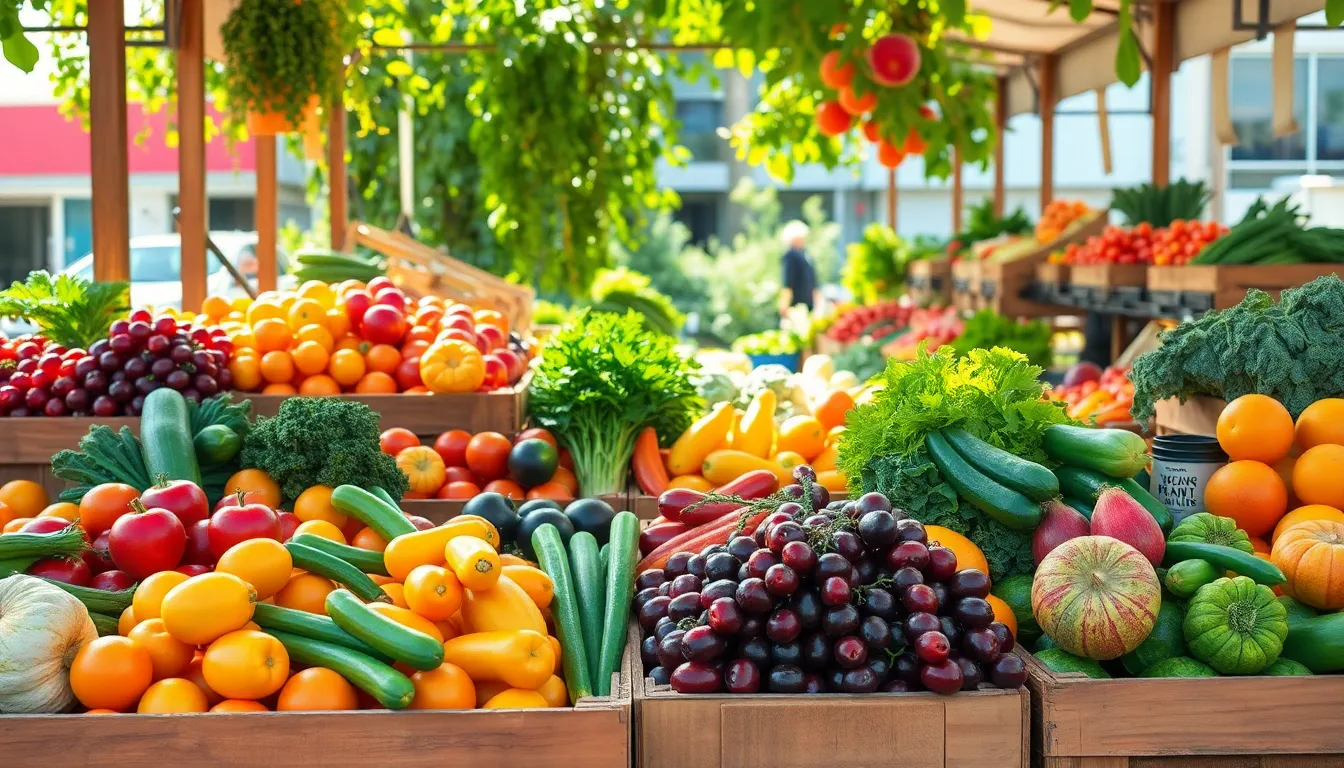In a world where takeout boxes seem to multiply like rabbits, the quest for sustainable meals has never been more crucial—or delicious. Imagine sinking your teeth into a meal that not only satisfies your taste buds but also gives Mother Earth a high five. Sustainable meals are the culinary superheroes we didn’t know we needed, swooping in to save the planet one bite at a time.
By embracing locally sourced ingredients and eco-friendly practices, these meals pack a punch of flavor while keeping our environment in check. So why settle for a bland, carbon-heavy dinner when you can indulge in vibrant, planet-friendly dishes? Join the movement that proves eating sustainably doesn’t mean sacrificing taste. It’s time to dig into meals that are good for you and great for the Earth.
Sustainable Meals
Sustainable meals contribute positively to both human health and the environment. These meals incorporate ingredients that minimize ecological impact while maximizing flavor.
Definition of Sustainable Meals
Sustainable meals consist of foods that are produced, prepared, and consumed with minimal harm to the ecosystem. These meals prioritize locally sourced ingredients, seasonal produce, and organic methods. Individuals often choose options that reflect a commitment to ethical farming practices, animal welfare, and reduced carbon footprints. In this context, meals may include plant-based dishes or responsibly raised animal products, emphasizing natural flavors and nutrition.
Importance of Sustainability in Food Choices
Sustainability plays a crucial role in food choices, impacting both individual well-being and the planet’s health. Eating sustainably supports local economies and reduces reliance on industrial agriculture. Choosing seasonal ingredients offers fresher flavors and decreases transportation emissions. Additionally, reduced food waste is another key factor, as sustainable practices often involve preparing meals that utilize every part of the ingredient. Consumers typically experience enhanced health benefits, as these meals often include less processed foods and more nutrients, creating a cycle of positive impact on personal health and the environment.
Benefits of Sustainable Meals

Sustainable meals offer numerous advantages that extend beyond individual plates. They positively influence both the environment and personal health.
Environmental Impact
Sustainable meals significantly reduce ecological footprints through responsible sourcing. Choosing local ingredients limits transportation emissions, which play a critical role in climate change. Fresh, seasonal products often require fewer resources to grow, promoting biodiversity. By investing in sustainable agriculture, consumers help support practices that enhance soil health and reduce chemicals. These methods contribute to cleaner water and healthier ecosystems, fostering a more balanced environment for future generations.
Health Benefits
Health improvement naturally follows from eating sustainable meals. Whole, unprocessed foods provide essential nutrients and heightened energy levels. Studies indicate that diets rich in fruits, vegetables, and whole grains bolster immune systems while reducing the risk of chronic diseases. Sustainable ingredients are often organically grown, minimizing exposure to harmful pesticides and additives. Awareness of food origins leads to better dietary choices. Furthermore, eating locally encourages seasonality, providing the freshest options available, which enhances overall meal quality and satisfaction.
How to Create Sustainable Meals
Creating sustainable meals starts with mindful ingredient choices and waste reduction techniques. Emphasizing freshness and locality leads to better flavors and health benefits.
Choosing Local and Seasonal Ingredients
Selecting local ingredients means shorter transportation distances and fresher produce. Seasonal foods taste better and often contain higher nutrient levels. Farmer’s markets often offer a variety of seasonal options, allowing consumers to discover local flavors. Choosing to prioritize organic produce helps support sustainable farming methods. Companies such as Local Harvest provide directories for finding local farms. Incorporating these practices can lead to a deeper connection with the food system and the environment, ensuring a positive impact on both personal health and community wellbeing.
Reducing Food Waste
Minimizing food waste plays a crucial role in sustainable meal preparation. Proper meal planning helps ensure only necessary ingredients are purchased. Leftovers can easily transform into new meals, reducing food disposal. Composting scraps not only enriches soil but also diverts waste from landfills. Utilizing freezing techniques extends the life of perishable items, maintaining freshness for future meals. By adopting these practices, individuals foster an eco-friendly kitchen that makes a significant difference in reducing overall food waste.
Sustainable Meal Ideas
Sustainable meals offer a variety of delicious options across all dining occasions. Adopting these ideas promotes ecological awareness while satisfying taste buds.
Breakfast Options
Start the day with a vegetable-packed omelet using seasonal produce. Incorporate local eggs to support nearby farms. For a quick option, consider oatmeal topped with fresh fruits and nuts, providing essential nutrients and flavor. Smoothies made with organic greens and berries create refreshing morning boosts. Choose whole grain toast topped with avocado for healthy fats and vibrant flavors.
Lunch and Dinner Suggestions
For lunch, create a hearty grain bowl combining quinoa, roasted vegetables, and a protein source like grilled chicken or chickpeas. Dress with a homemade vinaigrette made from local herbs creating fresh flavors. Dinner can feature a stir-fry with seasonal vegetables and tofu, served over brown rice, highlighting rich nutrients and variety. Sustainable fish options like salmon enhance protein intake while supporting eco-friendly fishing practices.
Snacks and Desserts
Healthy snacks can include raw vegetables served with hummus made from organic ingredients, promoting freshness. Fruit salads using locally sourced produce provide a naturally sweet treat. For dessert, consider chia pudding made from plant-based milk, topped with a mix of organic berries, for a nutrient-rich option. Baking with whole grains and natural sweeteners supports a wholesome diet while reducing processed ingredients.
Conclusion
Sustainable meals represent a powerful choice for individuals aiming to enhance their health while protecting the environment. By prioritizing local and seasonal ingredients, anyone can enjoy vibrant flavors that nourish both body and planet. Adopting mindful practices in meal preparation not only reduces waste but also fosters a deeper connection to food sources.
As more people embrace sustainable dining, the positive impact on local economies and ecosystems becomes increasingly evident. Each meal is an opportunity to contribute to a healthier world. With a variety of delicious options available, sustainable eating is not just a trend; it’s a lifestyle that benefits everyone.

